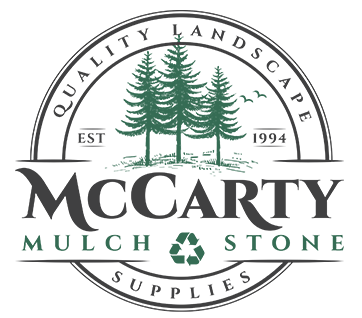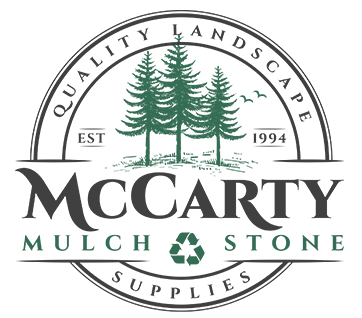What is Mulch used for?
Have you ever stopped to ask yourself “Why do we use mulch?” There’s a good chance, if you’ve been working on your yard or garden, you’ve either thought about laying some mulch around or have already. I’m willing to bet there are many who only spread mulch because everyone else does and they like the way it looks.
The truth is, mulch is essential for the health of your landscape. It helps to hold moisture, control weeds, and to prevent soil erosion. Mulch is remarkable stuff, and any yard or garden not taking advantage of it is missing out.
First of all, what exactly is mulch?
On the surface (pun intended) there’s an easy answer. Mulch is any material that is laid or spread over the surface of the ground as a covering. If we dig a little deeper though, it gets a bit more complicated since there are so many types of mulch.
Common Types of Mulch
I can assure you that there aren’t different types of mulch for aesthetic reasons only. Some are better at holding in moisture, or better at weed control for example. The type of mulch you need will vary depending on your goal. To determine what mulch you need, you’ll have to learn what each type of mulch is and what it’s good for.
Rubber Mulch
Are you trying to do your part in helping to reduce, reuse and recycle? If yes, then rubber mulch might be an excellent choice for you. It works well for landscaping and gardening and is fantastic as an outdoor flooring material.
Rubber mulch is usually made from tie rubber which has either been chopped up or shaved from tractor-trailer tires when they are being retreaded. While rubber mulch isn’t organic, it does serve some organic purposes.
For example, rubber mulch is much better at insulating soil from heat compared to wood mulches. Also, rubber is non-porous, so no moisture gets absorbed and lost as it makes its way through the mulch into the soil below.
Rubber mulch is very popular and used as a ground cover for playgrounds. It’s safer for children than wood mulch since it does a better job of breaking falls thanks to its elasticity, and it doesn’t biodegrade and need to be replaced every couple of years.
Bark Mulch
As the name might imply, it comes from the bark of trees. To be specific, it’s the bark from various conifers, like pines and firs. Bark mulch is unquestionably aesthetically pleasing, but it’s also beneficial for growing plants. For example, it slows moisture evaporation, and as it biodegrades, it adds nutrients back into the soil. One drawback of bark mulch, however, is that it’s lightweight and can be pushed around by wind or rain.
Hardwood Mulch
Being inexpensive, hardwood mulch sees extensive usage in gardens and other landscaping. Hardwood retains moisture well and does a fair job of insulating the soil. It’s mostly useful around plants that don’t need much acidity since it breaks down adding alkaline to the soil. Plants that need higher acid levels will require acid-increasing fertilizer.
Leaves
They are (usually) free and don’t take much work, and they can work well. There are, however, a few caveats when using leaves as mulch.
Using too thick a layer of leaves can have some negative effects on your soil. The leaves can mat together and keep air and water from reaching the dirt, and they can hold too much moisture creating the potential for rot and fungus. The best thing to do is shred the leaves first, but problems may still occur if you lay them on too thick.
Straw and Hay
Straw and hay are most popular for vegetable gardens. They keep soil and soil-borne diseases from getting splashed up onto plant leaves, and it helps make paths less muddy. Straw decomposes slowly and will usually last for the entire growing season. It makes a nice home for beneficial insects that will help keep the pests under control. Last but not least, it’s easy to rake up or work into the soil adding organic material benefiting next season’s plants.
Rocks / Gravel
Rocks can be handy and function similarly to rubber mulch as they allow for better water flow without absorbing it. Also, like rubber, rocks help the ground stay warm, just not in the same way. Whereas rubber acts as an insulator, rocks absorb the heat from the sun during the day, then release that heat keeping the ground warm through the night.
Just be careful when using rocks because other materials can build up between the rocks which could inhibit air and water from reaching the soil as well.
So Why Mulch?
It would be easier to ask why someone wouldn’t mulch, rather than why someone should as there are so many different reasons. The benefits of mulch are numerous. Healthier soil, greater plant growth, moisture control, weed control, and aesthetics are just a few that spring to mind. Maybe your goal is a better harvest, or maybe you want the best-looking yard on the block, mulch is going to be a key factor in pretty much any scenario.
With all the varieties, finding the best mulch for your situation can be easy. Many share similar properties, but each one has something the others don’t.
The Final Straw (Another Mulch Pun)
Mulch is a beautiful thing. Even with its drawbacks, it’s much more beneficial than many other things you can do in your yard and garden. Mulching will keep your plants growing stronger and healthier, your soil staying moist, and weeds from growing.
Mulch makes you work less pulling weeds, watering, and maintaining proper soil health. All you need to do with mulch is rake it about occasionally, and depending on the type you use, maybe replace it every few years.
Now you know what mulch is used for and what it can do to your garden. As you take care of it, mulch can be the greatest thing you ever did for your landscape.




